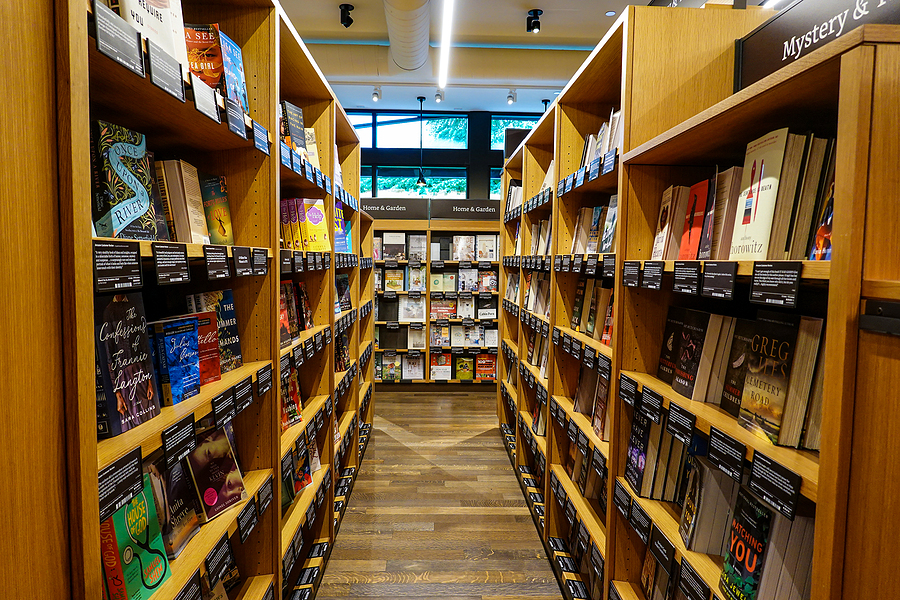In case you missed the news last Wednesday, Amazon announced that they are closing their 24 physical bookstores in the US. In addition, they are closing 44 other popup stores and 4-Star locations, which are not bookstores. (Thus the number 68 that you may have heard cited.)
They first opened a physical bookstore over six years ago in Seattle. Their list of locations in 12 states and D.C. can be found at this link. (Check to see if you have a store near you and didn’t know about it. Which was part of the problem.)
Some General Observations
1. It feels ironic that an operation that many consider the reason for the demise of many bookstores could not make it work. But retail is still part of their overall plan. They are launching a new store called Amazon Style in Los Angeles later this year. And late last year they opened their first Starbucks partnership with the New York city “Starbucks Pickup with Amazon Go” location. In other words, they are not done with various physical store operations.
2. Their bookstore model was not “The Everything Store” set up with tens of thousands of titles (like Barnes & Noble). Instead, the stores:
(a) were modestly sized (max 6,000 sq. ft. – for comparison, a typical Aldi grocery store or Walgreens drug store is usually around 12,000 sq. ft.)
(b) carried limited inventory (up to 6,000 titles, mostly face out; the above photo is from one of their stores)
(c) employed around 20 people
I think customers went in thinking of the old Borders-style or current Barnes & Noble store with 100,000 titles and were a bit surprised. Instead, they saw a smaller B. Dalton-sized operation. Could it be that customers were “underwhelmed” and didn’t return a second time?
4. Their locations are in high-rent districts for the most part. The one in my area is in North Scottsdale and is located on the back end of an Amazon Hub Counter Store, a place where you can pick up your Amazon orders over the counter.
5. Two years after launching their bookstore model, Amazon spent $13.7 billion to buy the Whole Foods grocery chain, and their retail focus had to shift toward integrating that massive operation into theirs.
6. A key vice president of their physical retail division resigned four months ago. While there are very capable people in charge, that person had been there from the beginning.
7. No specific closure dates are announced. If you live near one, check in periodically to see if they will have a “Store Closing! Everything Must Sell!” sale.
Some General Thoughts
1. Any time I see a chain of stores shut down I have to wonder about their lease arrangements. A typical location lease is negotiated for a set period of time with the option to renew (maybe five years at a time). At the end of a term, the owner may decide to move, or, in some cases, close, rather than renew. Many years ago one of the bookstores I managed had to close when sales were not growing enough to overcome the increasing rent we were paying in that location.
2. Other than the initial buzz about Amazon bookstores, there wasn’t much about them that set them apart from a good independent store or from a major chain like Barnes & Noble. One person commented that getting customers to sign up for Amazon Prime in-store wasn’t helping matters.
3. The pandemic hurt all physical stores. So with 2020 and much of 2021 operating in the red, you can imagine the discussions that must have been happening at their executive management level.
4. The inventory in these stores can easily be absorbed into the Amazon ecosystem. I suspect most publishers and authors won’t notice. For example, if each store carried three copies of a book face out (like pictured above), there were only 75 copies of that book in inventory across the 24 stores.
5. This is good news for independent bookstores in these 13 cities. There may even be a window for an entrepreneur to fill the gap left behind.
6. As with all retail closures, don’t forget the employees who are caught in the snare of lost jobs. Amazon does say that employees will be given the option to get severance or move to another Amazon store location in the area.
I’ll leave you with this insightful quote from Allison Hill, CEO of the American Booksellers Association:
“The closing of Amazon’s physical bookstores proves that there is more to a successful bookstore than the transaction of selling books. Amazon learned the hard way that what independent bookstores do is special, and it’s hard. Especially when faced with an unfair competitor. Hopefully, these closures bring the book business one small step closer to a level playing field”
(“Shelf Awareness” March 3, 2022 edition).



 Fun Fridays – March 4, 2022
Fun Fridays – March 4, 2022

It’s almost passed unnoticed,
last closing of the doors,
for few lights had been focused
on Amazon’s bookstores,
and that, methinks, is pity,
for every venture lost
in village and in city
incurs a hidden cost
by making trail that seems to lead
no higher than its end;
each handhold’s now a slender reed
that is sure to bend
and break before the final fall,
so better not to try at all.
This was such a great read, and the quote by Allison Hill was a perfect final touch. Too often, larger chains considered themselves superior. I think we all learned that many of the big businesses are just one pandemic away from bankruptcy. It’s tough when God has to humble us through life’s circumstances, but He still opposes the proud. Even in 2022. Praying for the employees who will be affected by the closing of the stores, and for the smaller, independent stores to experience growth and increase. Have a blessed week everyone!
Part of Amazon’s problem was not opening a store in Houston. All they had was a pop-up in the outskirts. Houston has a ton of writers groups, and even more book clubs. Bad move.
The closures are also a critique of the algorithmic approach that Amazon was taking. The claim was that they didn’t need such a large inventory because they could take advantage of the analytics from the online storefront. But as one person I saw recently commented, it didn’t result in a great curation experience, it just resulted in the equivalent of seeing the top best-sellers in stock. If there are algorithms that work for this, we haven’t found them yet.
Sometimes lessons learned are costly.
Especially in this regard.
Folks need options and the ability to shop for many titles, not just a few that may reach one genre or readership.
Thanks for giving this occurrence clarity.
We still have two independent bookstores in our area, three if you consider a used bookstore. One general market store about 30 minutes away from us that I frequent because it is a delightful little shop whose owners chat with you and give great book recommendations. There is a Christian bookstore about 45 minutes away from us and they offer many gift items, books, loose leaf tea, and homemade fudge. The buying experience is special in both locations and both stores will order in a book for you if they don’t have it in stock. Amazon could not provide the joy of going to a place like this.
On September 1, 2011, I was driving past a shopping center when I saw several people waving Borders “going out of business” signs. I made a quick right into the parking lot. Once inside, a lovely woman struck up a conversation with me. She spoke words of encouragement, with authority, that helped me get through the dire circumstances of the next few years. Whether she was an angel, or someone with the gift of encouragement, I can’t say for certain, but I still think about that encounter often, and her words still encourage me to this day.
I had two similar experiences this past week when my computer crashed and I took it in for repairs. The woman ahead of me turned around and stepped towards me, while her teenage grandson spoke with the tech. She said, “What would we do without our computers?” That began a lengthy conversation that led to Jesus taking us Home soon. She said she was encouraged by our talk, and so was I.
When I returned a few days later to pick up my restored PC, a similar event took place. The lady ahead of me turned and apologized, because she didn’t have an appointment. I told her not to worry, I had time. While the tech became busy elsewhere, she started a conversation with me that, again, led to God and ended with both of us feeling encouraged.
It’s sad, for me, when a store closes its doors, for more reason than one.
(Even so, I won’t be shedding tears for Amazon.)
I wonder how much this was a result of clashing brand images. We all have certain expectations when we see a major brand name. For Amazon, we likely think: vast selection, cheap prices, little to no interaction with the seller. It would be a distinct marketing challenge to suddenly re-associate that brand with a comfortable in-person shopping experience. *Shrugs*